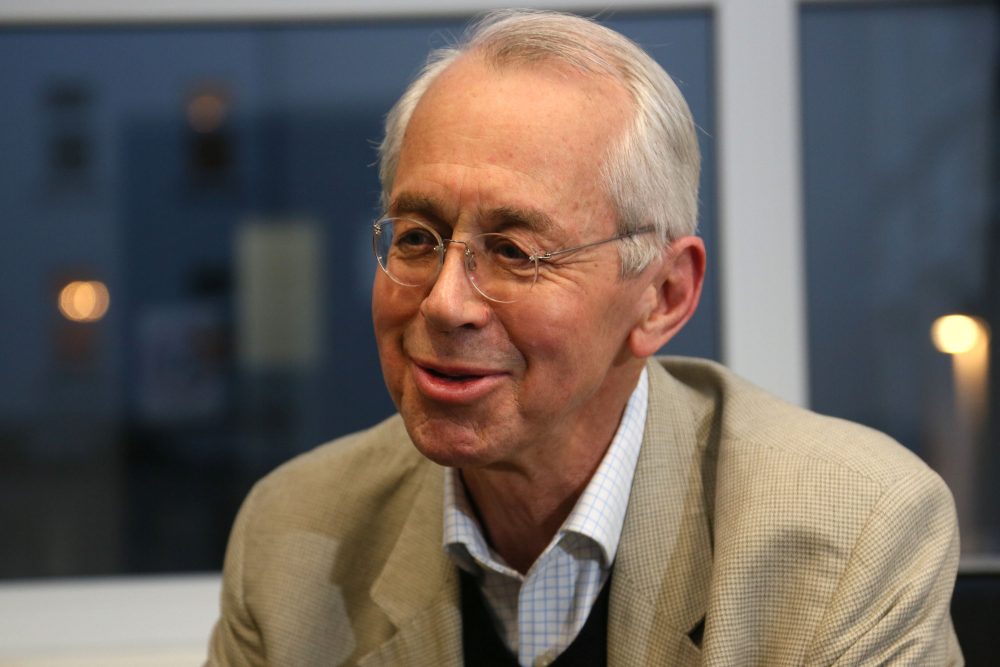
Photo by Marc Darchinger.
Stein Ringen is an Oxford University political scientist and author of The Perfect Dictatorship: China in the 21st Century. Before taking part in a Zócalo/KCRW Berlin panel discussion titled “What Does Democracy Mean in the 21st Century?” held in partnership with the Villa Aurora/Thomas Mann House and the Daniel K. Inouye Institute at the CIEE Global Institute in Berlin, he spoke in the green room about his old French teacher, how Brexit has affected British behavior, and why he’d want to visit Renaissance Florence.
We’re living at a time when there’s a lot of anger, fear, and uncertainty. Are there ways in which you’ve changed your own personal behavior, or the way you interact with people, in response to this global mood?
I don’t know about that, but I certainly know that we are in, let’s say, times of anger. And we know it very well in Britain, with Brexit. It is horrendous how this is infiltrating our social lives. We think about other people in terms of where they stand on the Brexit question, which is horrendous, but I know I am caught up in it myself.
Do you find yourself sizing people up by sight, on the street?
Well, we actually do. We’ll see someone and say, “Oh, I bet he’s a Brexiter, or she’s a Brexiter.” It’s a lack of civility, where we are not well able to disagree.
Do friends or family members steer around the subject in conversation?
This happens; we notice it amongst our friends and in social settings. I’m aware of this, I think that it’s awful, but I’m also caught up in it. I lost a bridge partner over the Brexit issue.
What do you do to unwind? Do you unplug?
I try to. I was stopped the other day by someone on the street, in Richmond, in London, where we live. And he said to me, “Can I stop you? I’ve been looking at people walking up and down the street, and they all look very tense, and you don’t! So why is that?” And I said, “I don’t know!” So I try. I just thought he was a very strange character.
Was there a particular teacher who influenced you?
Oh yes, my French teacher in high school, Bernard Ragvin. He’s still around, he’s a very old man, I’m still in touch with him. He taught me to be interested in French language and French culture, and he taught me something about teaching. He was a very hard teacher. I liked him very much.
What are you reading right now for pleasure?
I tend to read history. I’ve just read a biography of Machiavelli, Be Like the Fox, by Erica Benner. It’s a wonderful book. And I have just read a biography of Leonardo da Vinci, by Walter Isaacson, which is a really nice book because it portrays da Vinci as generous, interesting, nice, helpful—in all ways a good human being. And you don’t get many biographies where the point is to say that, “This is a very nice man.”
Which social media do you use, and which do you not use?
I’m not sophisticated on social media. But I write a blog called thatsdemocracy.com, and I do use Facebook, although now of course there are questions about whether we should, but I still do. I’m a pretty active user, in that I use Facebook to distribute posts from my own blog. That’s my social media world.
If you could time-travel to any period, past or future, just to visit, which would you choose?
It might be Renaissance Florence. But I wouldn’t want to live in any other times than where we live now. These are the best of times.
What appeals to you about the Florence of that time?
Well, the republic—this was the forerunner of democracy, in the sense that it was government, in some way, under popular control, although “popular” was not a broad concept then. But still. And there was an idea—this was also Machiavelli’s idea—that under that kind of rule people can live in safety and freedom. So it was the forerunner of democracy, it was enlightened, and everything happened in terms of thinking and art. So it was a vibrant time, and it’s very easy to see it today. You can go there and see it in the streets and the museums.
Why is this the best of times?
Well, as terrible as many things are, people’s lives have never been better than now. And I don’t mean just us in Europe, but the whole world. And in two very important ways—the risk to individuals in being the victims of violence, it’s lower than it’s ever been. There’s a lot of violence, but the risk is lower. And the risk to individuals of being in poverty is lower than it has been. So there’s a lot of violence and war and famine out there, but if you look at the historical trends it’s never been so good.



